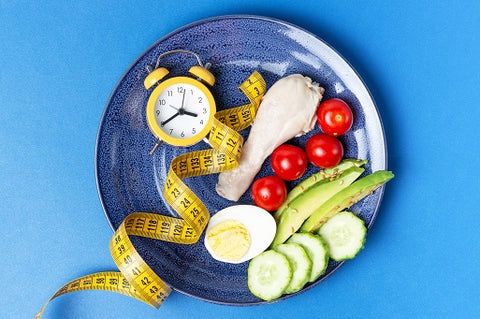
It can sometimes be difficult to maintain intermittent fasting. For example, if you just went on vacation, it can be difficult to pick up the thread afterwards. Nevertheless, there are a number of useful tips that can help to keep intermittent fasting longer in a pleasant way.
Tip 1: fixed for shorter periods
You can last longer if you fast for shorter periods. Popular methods include: a 5:2 pattern and the 16:8 method. Fasting for 48 hours or even 72 hours puts you at greater risk of dehydration, irritability, mood swings, fainting, hunger, lack of energy, and difficulty concentrating. That is why it is wise not to fast for more than 24 hours in a row, especially in the beginning, because otherwise your body will react badly to it.
Tip 2: grit your teeth for a while
In the beginning you will have a hard time with the feeling of hunger. Be aware that this feeling of hunger will disappear in no time and certainly do not break the fast. Try to find distractions so that you think as little as possible about your feeling of hunger.
Tip 3: Stay hydrated

A tip that you should definitely keep in mind and not forget. Dehydration can bring symptoms. Just think of a dry mouth, thirst and headache. It is very important that you get enough fluids every day. That amount is actually very personal. When you fast, you will probably drink more water because you normally get about 20 to 30% of your fluid needs from food. One person drinks 2 to 3 liters of water while fasting, but it can also happen that you drink less or more, depending on how thirsty you are. Feeling a little faint and fasting for weight loss? Then consider drinking a cup of fresh bone broth with salt. You will soon feel better as a result. In addition to water and broth, you can also drink black coffee and tea.
Tip 3: do a quiet activity
We all have those days when we are bored and then eat faster because we are bored. Stay busy on such days too. Do activities that don't require too much effort, such as walking, taking a bath, reading a book, or meditating.
Tip 4: do not eat a calorie bomb immediately after your fasting period
'My fasting period is over, so now I'm going to eat a delicious meal'. It seems like a happy thought, but your body can react badly to this. For example, there is a chance that you will feel bloated and tired afterwards and you may lose less weight.
Tip 5: probably not if you have a bad feeling about it
Especially in the beginning you may feel tired, hungry or irritable. That is why we recommend fasting for less than 24 hours in the beginning. Do you feel like you are getting sick or feel so tired and weak that you can no longer carry out your daily activities? Then stop fasting and get medical help. You can then look for a solution together and find something that is suitable for you.
Tip 6: don't forget your daily portion of protein
The main reason people fast is to lose weight. The danger of this is that you will also lose your muscle mass. Do you want to limit that as much as possible? Then make sure you consume enough proteins during your eating moments. In this way you will counteract the loss of your muscle mass and you will have less of a feeling of hunger.
Tip 7: eat as much as possible unprocessed and

rich foods
It is not the intention that you only consume warm meals and fast food during your eating window. Eat as much unprocessed food as possible to limit the risk of cancer, heart disease and other chronic diseases. So choose meat, fish, eggs, vegetables, fruit and legumes. Also consume whole grain products, because they give you a feeling of satiety for longer. Avoid foods high in fat and sugar as much as possible.
Tip 8: take nutritional supplements
Have you been fasting for a while? Then you may be deficient in essential nutrients such as iron, calcium and vitamin B12. During fasting, it is more difficult to get your daily nutrients because you absorb fewer calories. Therefore, try to consider taking extra supplements so that you do not have any deficiencies.
Tip 9: build up your sports activities slowly
If you do intensive and professional sports, it is advisable to do your training at a lower intensity in the beginning. Start with a light workout or walk. That way your body can slowly get used to fasting. Watch how your body reacts to it and listen to your body.
Tip 10: be at peace with your body and mind
Don't forget why you're fasting. At first it will be for your body, but also definitely for your mind! Remember the slogan 'happy mind, happy body'. You will need discipline and perseverance to complete a successful course. If you lose weight and eat healthier during your eating window, you're automatically going to feel better than if you don't.
Tip 11: don't give up immediately!
It will be hard to keep up at first, but try to do it anyway. It also takes a while before you start to experience the benefits of fasting (about 3 weeks), so try to stick with it for at least 3 weeks. After that you can decide if you find it an effective method.
Hopefully you can get started with these tips. Be sure to check out our other blog posts about intermittent fasting and Svensson's range. Success!







